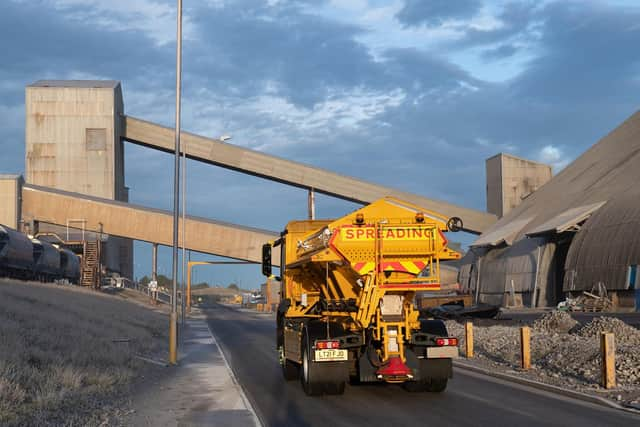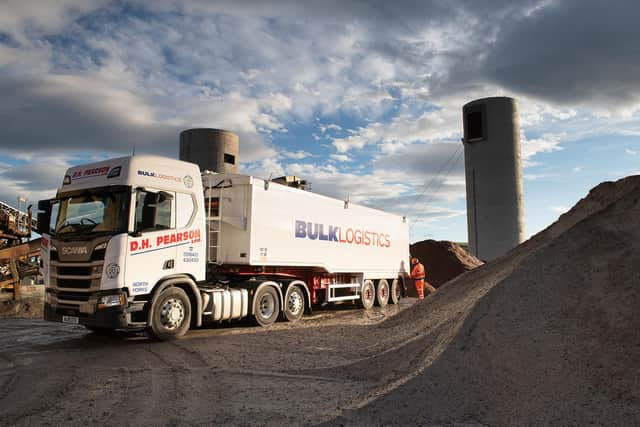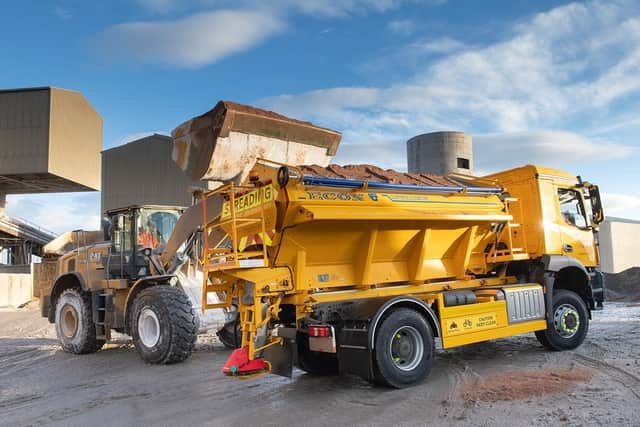True Grit! Boulby Mine features in new NY Highways video
and live on Freeview channel 276
The County Council used about 50,000 tonnes of salt last year, and all of it came from Boulby Mine, one mile west of Staithes on the east coast.
If all the vehicles needed to deliver that salt were lined up nose to tail, they would stretch from Northallerton to Ripon.
Advertisement
Hide AdAdvertisement
Hide AdNigel Smith, the County Council’s Head of Highway Operations, said: “Last year, we carried out 10,200 treatments of the highway network in North Yorkshire, clocking up enough miles to travel around the world 22 times. That is only possible because of the really strong partnership and collaboration between the County Council, NY Highways and mine owner ICL.”


NY Highways was formed by the County Council earlier this year to carry out highway maintenance, so this is the company’s first winter.
Operations Manager Mike Francis said: “We have a strong team of drivers and a young fleet of 80 vehicles, including 18 new replacement gritters added ahead of this winter.
This year’s gritting operation has already begun, of course, and we’re well prepared for whatever the winter throws at us over Christmas, New Year and beyond.
Advertisement
Hide AdAdvertisement
Hide Ad“To ensure we have ample salt stocks, we do a weekly stocktake of the salt levels in our barns, then place orders with ICL at Boulby to replenish the stock as required.”


Boulby Mine, which is a member of the Salt Assurance Scheme, dates back to 1968 and has been part of ICL Group since 2002.
ICL Boulby’s salt was deposited around 225 million years ago as ancient oceans drained, leaving the natural mineral substance behind.
It can be found 1,100 metres down in a seam beneath the potash horizon. The mine is responsible for supplying around half the de-icing rock salt used on UK roads during winter, removing the need to import salt into the UK.
Advertisement
Hide AdAdvertisement
Hide AdMark Thompson, Salt Sales Manager, said: “ICL is proud to be part of the local communities within which we live and work, and the wider communities spanning the length and breadth of the United Kingdom.


Our key objective is to secure the safety and mobility of the public through the timely provision of salt. Our ability to perform is greatly influenced by the strength of the relationship we have with colleagues, customers and the wider supply chain.”
ICL Boulby has been mining rock salt for more than 40 years and has access to multi-million tonnes of mineral deposits. Generally, between 350,000 and 1,000,000 tonnes are mined each year, most being used for winter road maintenance.
The mining operation uses a boring machine, similar to the machines used in cutting road and rail tunnels.
Advertisement
Hide AdAdvertisement
Hide AdThe tungsten-carbide tips of the rotating head bore into the substance, producing smaller lumps that are taken to a crushing and screening plant. The substance is treated with an anti-caking agent to stop the pieces coagulating.


This means it can be held in local storage depots, ready for use on the roads whenever needed.
North Yorkshire County Council spends between £6m and £10m each winter on gritting, depending on the severity of the weather.
The fleet is on call 24 hours a day and is complemented by more than 100 farm contractors, who can be called in to help to clear roads.
Advertisement
Hide AdAdvertisement
Hide AdIn addition, there are about 8,000 grit heaps and bins around the county.
County Councillor Don Mackenzie, Executive Member for Access, said: “We place the highest priority on helping traffic to keep moving safely in winter. It’s vital to residents and businesses.
We grit as required to keep our roads open. Knowing that we have a close relationship with a reliable supplier on our doorstep enables us to plan ahead and treat our roads with confidence.”
Information about when and where gritting takes place and grit bins can be found at https://www.northyorks.gov.uk/winter-serviceThe county council has 23 weather stations at key roadside locations around the county.
Advertisement
Hide AdAdvertisement
Hide AdThese broadcast up-to-date images that the public can view to help in planning journeys.
To view the cameras to check road conditions before travelling visit www.northyorks.gov.uk/road-cameras-and-weather-conditionsAdvice about driving in winter is available at www.northyorks.gov.uk/safe-winter-driving
During gritting operations, updates are posted on the council’s Twitter account and Facebook page. Follow @northyorkscc or #nygrit and www.facebook.com/northyorkscc